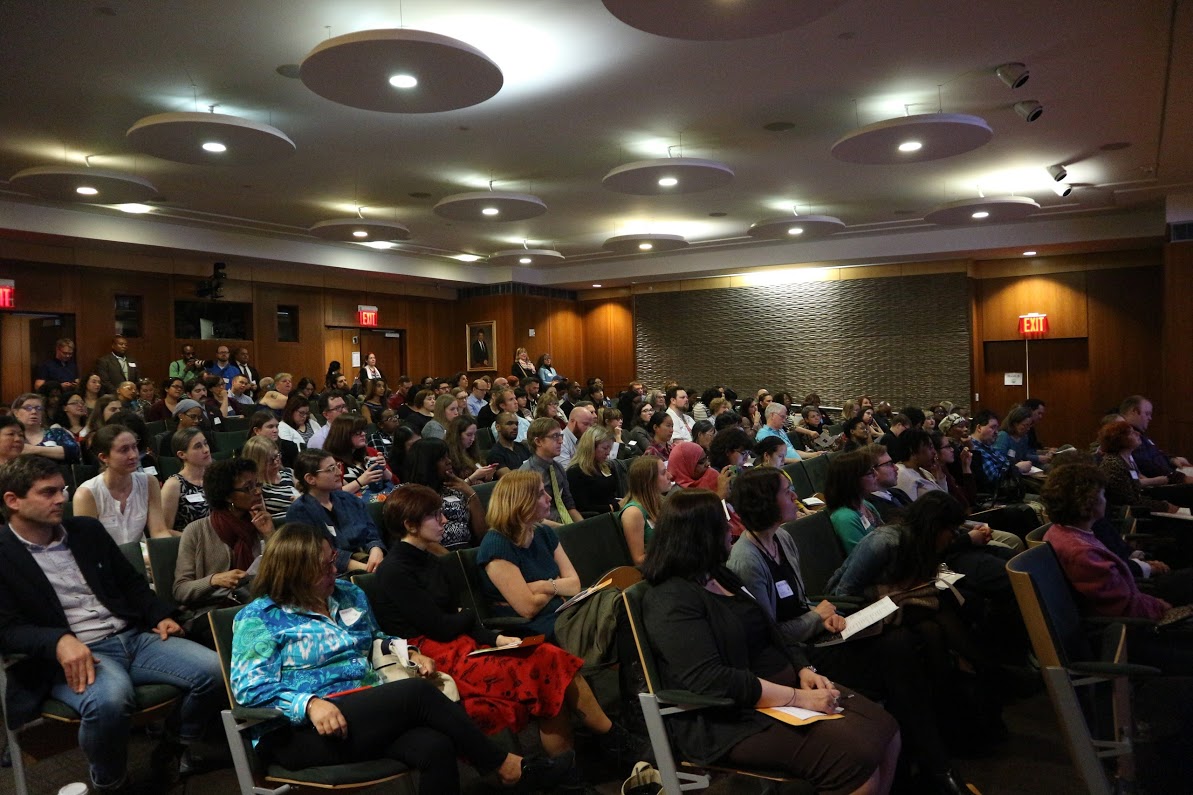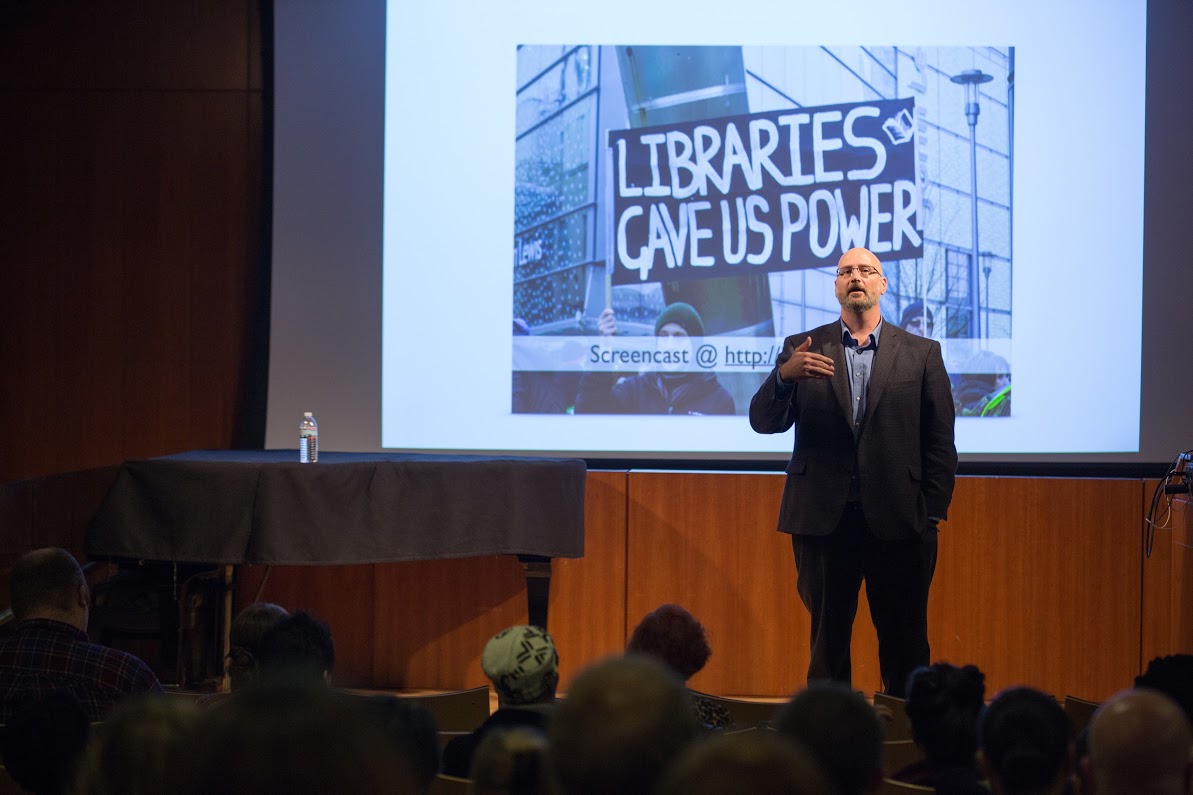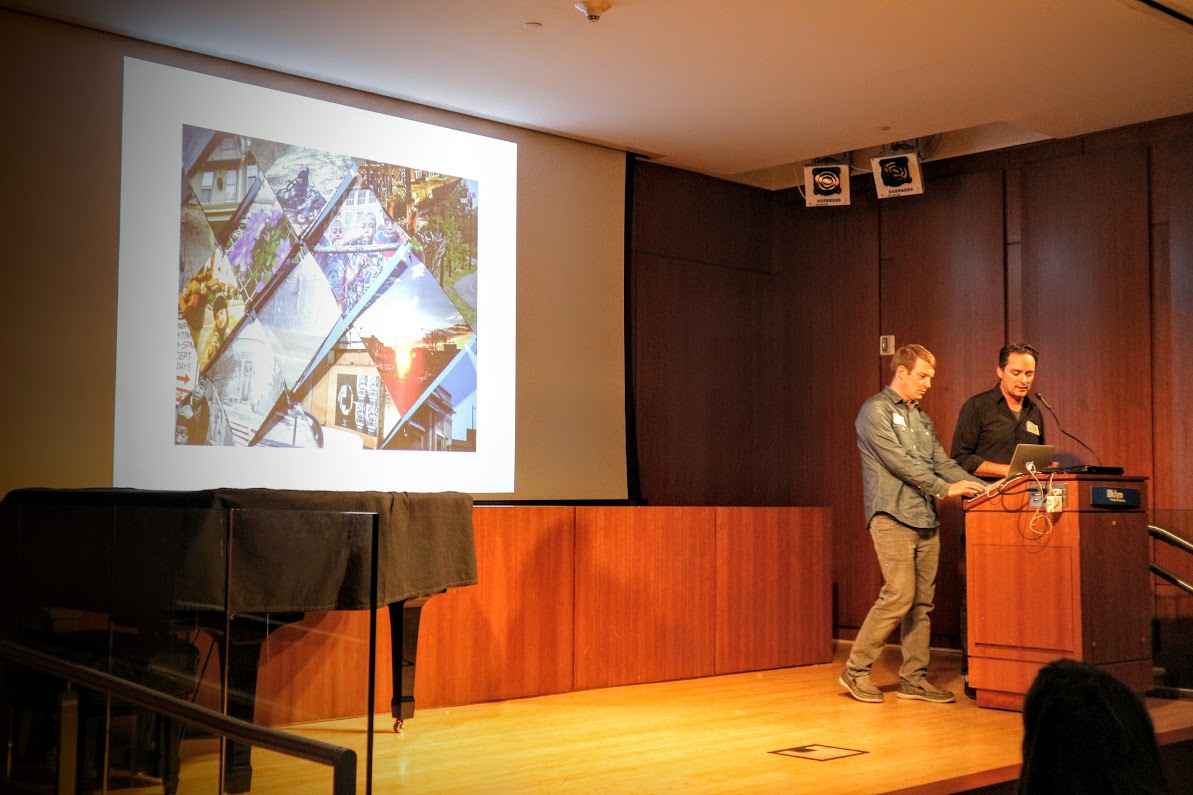callan \ blog
| reflections on #ULCON16 (urban librarians conference)
may 8, 2016
On Friday, a group of fellow Bostonians (and superfriends) and I snuck down to Brooklyn for the third annual Urban Librarians Conference. This one-day, ultra-cheap event is the brainchild of Urban Librarians Unite, a New York-based collective that "pushes the advocacy envelope with interesting and innovative events and in-your-face activism." The conference puts sessions and speakers right in the midst of the many librarians working in New York and the boroughs, giving them the opportunity to meet up and learn without shelling out big time ($30 advance registration says what?).
We helped out with setup and registration, which in my case mostly consisted of frantically assembling 200 swag travel cups that arrived in three separate pieces and wrapped in a distressing amount of plastic. Armed with the indefatigable conscientiousness that's part and parcel of this profession, though, our little team somehow finished with enough time to get into the auditorium for R. David Lankes's keynote.

Standing room only in the Brooklyn Public Library's Dweck Center for Contemporary Culture. (Photo credit: ULU.)
Lankes reminded us to acknowledge and take pride in the fact that the problems we face on the job are complex and inherently "un-algorithmic." Unlike successful rocket launches, people don't conform to the neat, predictable parameters that equations and regressions would like us to exhibit - they're unruly and chaotic and just as likely as not to pivot into some unexpected action or mindset or what-have-you. So, just as there's no one-size -fits-all model of library service that can can be prefabbed and plugged into every city, town, or school, the daily interactions and issues we encounter are emergent and no amount of mathematic precision can make them any less unexpected.
This made for a strong call to action for us to rethink the aspirational narrative of libraries within our communities, to level and reconstruct our buildings and service models in a way that accounts for the diversity, the quirks, and the constantly changing nature of our constituents. That's my underlying argument for the importance of user experience design in libraries - which Lankes rightly labeled as having baggage from the corporate world. Recently, I attended a UX event where there was some discussion about what the end goal of UX design really is - the creation of a new product or service, or the development of empathy. That's in the eye of the practitioner (or maybe more accurately, the practitioner's employer); if profits are to be made, it kinda has to be the former. So, maybe libraries need a different term, then - something less corporate, something less, uh, Silicon. Service design might be close enough.

R. David Lankes, closing his keynote. Yes, I resisted the urge to break into singing "A Design For Life." (Photo credit: ULU.)
Either way, next up I dropped into EveryLibrary's session, led by Patrick Sweeney. He gave a crash course in drawing the parallels between librarians and political candidates, providing strategy for how the pavement can be pounded (and by "pavement," I mean "email," and tools like Nationbuilder CMS) to lead to better results at the ballot box. It's been proven both in libraryland and the political sphere at large that it's much harder to ignore or vote against personal stories and individuals than bureaucratic instruments of big government.
After lunch, I joined a small roundtable discussion about the various employment challenges we face in the field. This began with the topic of race - by the latest estimate, 88 percent of the profession is white. (Side note: By contrast, I'd say the group at ULU was far and away the most diverse I've ever seen at an LIS conference. It certainly beat the pants off the ratio we tend to see at New England events.) We talked about some of the reasons behind that disproportionate number and what's being done (or not being done) to address it. It's especially a problem in Massachusetts, where inroads are being made at Simmons College's SLIS but far more still needs to happen.

The group discussing LIS employment challenges. (Photo credit: ULU.)
From here, we moved on to discrimination against the unemployed and underemployed. In some ways the issues both groups face seem to stem from similar causes - the lack of risk-taking, the diminished emphasis on (or support for) professional development, the economic factors. It's true these problems plague just about all industries and fields in 2016, but I'd argue it's particularly bad for libraries; they rely on institutional and community knowledge, plus passion and opportunities for collaboration and innovation. There are other jobs where this is the case, sure, but that doesn't diminish our need for a greater personal investment to be taken in part-timers and people with gaps in their resumes or skillsets.
The last session I got to was a talk by the DC Public Library's two makers-in-residence. They described their use of the city's libraries to permeate gallery experiences into the streets with prominent displays along first floor windows and as a prototyping grounds of sorts, building interactive sculptures out of found materials and trying out new sculptural forms, like 3D-printed objects that correspond to maps of user journeys.

Billy Friebele & Mike Dax Iacovone, makers-in-residence at the DC Public Library. (Photo credit: ULU.)
The makerspace itself can be intimidating for some - there are steep learning curves, and a degree of uncertainty is always involved. But the artists have done what they can to foster an environment open to trial and failure rather than guaranteed productivity. They encourage serendipitous making, creating things that might not come out as intended, or even just following directions to the letter for replicating an existing project. Though they don't work with it, they also gave a shout-out to DCPL's brilliant and hugely popular Memory Lab, an old media conversion and self-archiving center where librarians are on hand both to help with the equipment and the archival/organizational know-how.
We wrapped up the day with a happy hour afterparty at a nearby bar, giving us a chance to unwind and let our buns down for informal networking funtimes. I was told, not for the first time, that these opportunities are the best of all; they're what leads to the most lasting friendships and occupational alliances, and I can easily see how. Though we have a proclivity for being a bit more married to our jobs than we ought to be, we contain multitudes, and there's very few formal conference sessions that give us the chance to delve into any of 'em.
The more traveling and networking I do, though, the more I can see this whole library thing as career and not just job. ULCON was an empowering (and shockingly affordable - yes, that bears mentioning again) reminder of why I stick with it, despite my routine frustrations. Not only does it help to see we're not alone in our travails - it's uplifting and inspiring to hear about the creative, impassioned work so many of us are up to.
home | top
Hey Cal, why is there no comments section? Comments sections have a tendency to devolve into nasty little spaces, teeming with spam & ad hominem attacks. I also have a fondness for the 1.0 Web (props to Neocities, powerer of this site). If you'd like to share your thoughts, find me on Twitter or fire off an email. Thanks!